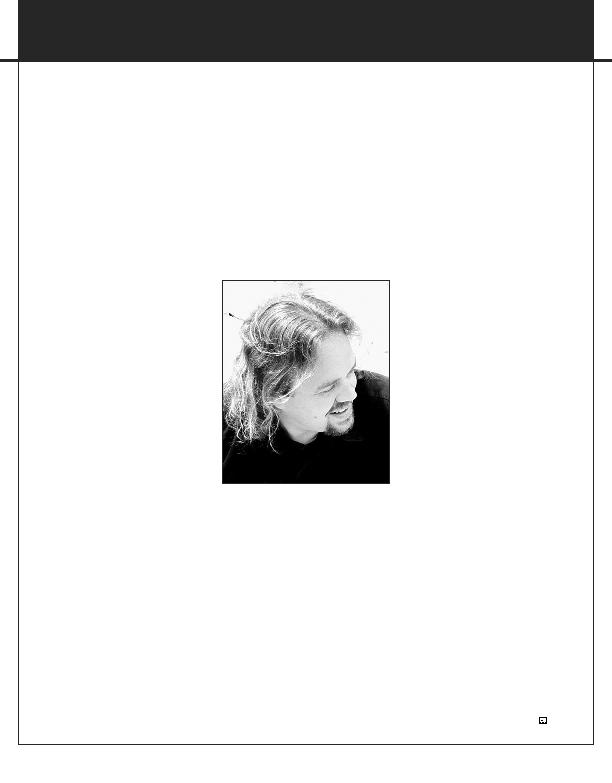
made throughout Hollywood history. The
transition from visual effects to writer-direc-
tor of romantic comedies is one fewer have
made, but it's the one traversed by Grant
Boucher, a longtime visual effects worker
who can count Titanic and Star Trek: Voyager
among his many credits.
aspiring online journalist who gets the scoop
of a lifetime when a one-on-one interview
turns into an unexpected date with Holly-
wood's hottest young ingénue.
geek who was a "true math/science/com-
puter prodigy." Boucher seemed destined to
become an astronaut; he pursued a Mission
Specialist career path until the U.S. put a
hold on the space program after the Chal-
lenger disaster in 1986. Boucher also discov-
ered he preferred scientific explorations,
which led him to pursue a degree in theoret-
ical physics.
Dungeons & Dragons. He learned he was a
far better Storyteller/Game Master than
Player and he used his creativity to generate
stories for his friends. Boucher submitted
an "adventure" to the magazine Dragon
and the editor liked it enough to feature it
in the magazine.
up on his scientific aspirations, though,
Boucher decided to double major in theo-
retical physics and English. He also
worked as a Dungeons & Dragons and Star
Wars RPG designer and author. His work
there eventually paved the way for a ca-
reer in visual effects.
names in Hollywood: Steven Spielberg,
Morgan Freeman and James Cameron,
time or another, have encouraged me to ac-
tively pursue the directing chair," Boucher
says. "Eventually, I listened."
realized he would have to craft his own story
if he wanted to get the gig he was looking for.
ties being offered to VFX (visual effects) vet-
erans," he explains. "And even those tended
to be light on story, heavy on VFX -- not
very satisfying when compared to the caliber
of work of my mentors."
affect the way he writes today. In fact, he was
one of the first people to read the initial
script for Cameron's Avatar -- over 14 years
ago. Inspired by Cameron, Boucher works
with "scriptments;" 30-page treatments that
follow a pattern he saw Cameron use.
comedy titled My Daughter the Destroyer,
about a hapless stay-at-home father who
shepherds his daughter through her terrible
twos. Though the script hasn't sold, it re-
Boucher to write more comedies.
were once seen as a liability have now ap-
parently made me one of a few `triple
threats,'" Boucher explains. "I do understand
story and filmmaking from both the classic
and new technology sides of the equation
and that means I can handle strong dramatic
storytelling in the age of the greenscreen."
ing. "Seeing the inner genius of a great
screenplay -- learning why and how it
works so effectively as mythic storytelling
-- is part of what makes screenwriting so
exciting and challenging," he explains.
Boucher does not re-invent the wheel,
however, arguing that scripts need a strong
structure, classic storytelling and archetyp-
ical characters. Not surprisingly, it was his
take on a friend's story that landed him the
gig to pen the Journies script.
friend), Robert Sanchez, inspired the
Journies plot. Boucher describes the pro-
ceedings as a hybrid between two unique
works: "It has the classic underpinnings of
Romeo and Juliet, but with the posse of main
characters along the lines of Entourage," he
explains. Boucher also feels he was
uniquely qualified to write the script be-
cause he was inspired by "all my geeky
friends and colleagues and all the women
who've dumped me," he laughs. "Because,
you can't write comedies about romance if
you've been happily married to the perfect
woman since high school."
talent to reignite his career as a triple-threat
akin to one of his mentors. "James Cameron
had such a profound effect on me as to what
it meant to be a serious filmmaker," Boucher
says. "I wanted that path, even if it took
decades to get there -- or forever."